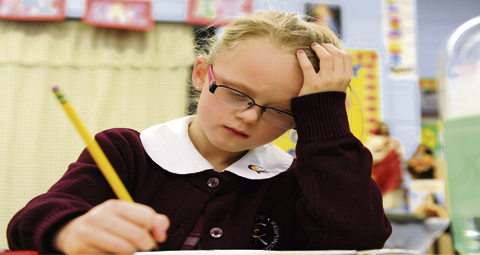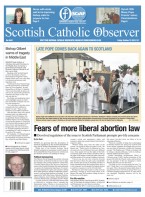April 3 | ![]() 0 COMMENTS
0 COMMENTS ![]() print
print

Some are more equal than others
By Michael McGrath
In the past weeks there has been a significant political event in Scotland. Surprisingly, it doesn’t relate to the general election campaign, which is underway and building up towards the frenzy of polling day on May 7. The big story—which you might even have failed to notice happening—was the launch of the Education (Scotland) Bill by Education Secretary Angela Constance during a visit to St Mary’s Primary School in Leith.
What is groundbreaking in this legislation is that it will place a statutory duty on councils to address educational inequality and require councils and Scottish Ministers to report on progress. Now some might argue that this is pretty dull fare—just another political gesture, a benign aspiration towards raising educational standards and attainment, which will make no real difference. Hardly an event of note, you might think.
However, I think that this Bill has the potential to be explosive, if it is implemented and resourced appropriately. For it is aimed directly at what is undeniably the great failing of our age—our apparent inability to raise the country’s poorest children out of poverty and to address the educational inequalities, which still evidently exist in Scotland.
When training to become a teacher 40 years ago, my peers and I were profoundly affected by Born to Fail, a ground-breaking study published by the National Children’s Bureau in 1973. It evaluated the impact of inequality and disadvantage on a cohort of 11-year olds living in Great Britain and found a clear relationship between how growing up in disadvantaged circumstances damaged children’s outcomes in life—from low birth rate to attainment in education.
Some 50 years later, NCB published ‘Greater Expectations,’ which showed that significantly more children grow up in poverty today, 3.5m compared to 2m, and these children suffer devastating consequences throughout their lives. NCB Chief Executive Dr Hilary Emery said at the time: “Our analysis shows that despite some improvements, the inequality and disadvantage suffered by poorer children 50 years ago still persists today. There is a real risk that as a nation we are sleep walking into a world where children grow up in a state of social apartheid, with poor children destined to experience hardship and disadvantage just by accident of birth, and their more affluent peers unaware of their existence.”
Even more recently the Joseph Rowntree Foundation published Monitoring Poverty and Social Exclusion in Scotland 2015, its latest in a series of reports monitoring poverty and social exclusion in Scotland since 2002. It shows that, while child poverty rates fell from 33 per cent in 1996/97 to 22 per cent in 2012/13, the attainment gap between pupils who live in deprived and wealthier areas remains wide. The report claims that, while the gap has narrowed slightly, at the current rate of progress it would take 28 years for S4 pupils in the bottom quintile to reach today’s level of attainment of those in the top.
It is truly shameful that, in a country of such prosperity, we are still failing to overcome the poverty and disadvantage that wreaks havoc on children’s lives, causing them to lag far behind their more affluent peers in almost all areas of their lives, from health to education, early development to housing and employment. So I, for one, hope that the Education (Scotland) Bill will provide the means and the incentive to tackle the child poverty and inequality that has been a permanent feature in our country for so long. It will require sustained commitment and a determination to demand better outcomes from all the welfare agencies.
Clearly government and politicians have to play the leading role in addressing this but responsibility lies with all of us for having greater expectations for every child. It is simply not acceptable for any teacher, or any parent for that matter, to say: “What more can you expect of this child, given where she/he comes from?” Nor can any of us submit to defeatism, believing that the problem of disadvantage is too complex to resolve.
This is why I was particularly interested in another measure in this bill that places a duty on every council to appoint a chief education officer, with the necessary qualifications and experience in education. At a time when councils are under the most severe financial constraints, moves to re-structure the delivery of services has led to some council officers being required to take on wider responsibilities. The consequent danger is that the person with lead responsibility for managing the council’s education services might have had no direct experience of, or professional qualifications in, education. I hope that this his new measure avoids that pitfall.
For effective leadership is the key to unlocking the potential of every child. We need committed, able leaders of learning who know how children and young people should be inspired, motivated, supported and praised. We need leaders at system and school levels who can communicate a clear vision for improving the future of our young people.
We need headteachers and classroom teachers whose values demonstrate their commitment to fulfilling the potential of all young people, inspiring them to ‘live life to the full.’
Whatever the outcome of this General Election, or of the next election to the Scottish Parliament, no matter which politicians hold the balance of power, we must demand that they all show the necessary leadership to turn fine words into significant actions that will avoid trapping another generation of young people in poverty.
—Michael McGrath is director of the Scottish Catholic Education Service.
Milngavie school closure is not a Church decision
By Michael McGrath
East Dunbartonshire Council’s decision to remove the only Catholic school in the town of Milngavie is clearly unjust. It will require Catholic children to travel further if they wish to access Catholic education in a new merged school in Bearsden.
By comparison, children who attend the four non-denominational schools in the area will continue to be able to access these schools. One would think that such a blatant act of discrimination would have beenblocked by the Scottish Government.
It was for this reason that Church representatives appealed, firstly to the council and then to the Scottish Government. Both East Dunbartonshire Council and the Scottish Government rejected these appeals, arguing that the closure of St Joseph’s does not amount to a ‘significant deterioration’ of school provision.
Parents should be quite clear where the responsibility for this decision lies and it isn’t with the Church, as Kevin McKenna [SCO March 20] should know.











